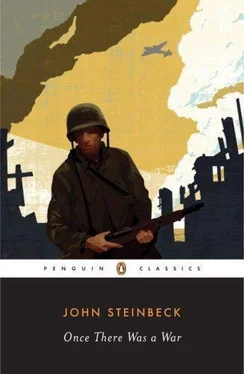John Steinbeck - Once there was a war
Здесь есть возможность читать онлайн «John Steinbeck - Once there was a war» весь текст электронной книги совершенно бесплатно (целиком полную версию без сокращений). В некоторых случаях можно слушать аудио, скачать через торрент в формате fb2 и присутствует краткое содержание. Город: New York, Год выпуска: 1960, Издательство: Bantam Books, Жанр: Классическая проза, на английском языке. Описание произведения, (предисловие) а так же отзывы посетителей доступны на портале библиотеки ЛибКат.
- Название:Once there was a war
- Автор:
- Издательство:Bantam Books
- Жанр:
- Год:1960
- Город:New York
- ISBN:нет данных
- Рейтинг книги:3 / 5. Голосов: 1
-
Избранное:Добавить в избранное
- Отзывы:
-
Ваша оценка:
- 60
- 1
- 2
- 3
- 4
- 5
Once there was a war: краткое содержание, описание и аннотация
Предлагаем к чтению аннотацию, описание, краткое содержание или предисловие (зависит от того, что написал сам автор книги «Once there was a war»). Если вы не нашли необходимую информацию о книге — напишите в комментариях, мы постараемся отыскать её.
Once there was a war — читать онлайн бесплатно полную книгу (весь текст) целиком
Ниже представлен текст книги, разбитый по страницам. Система сохранения места последней прочитанной страницы, позволяет с удобством читать онлайн бесплатно книгу «Once there was a war», без необходимости каждый раз заново искать на чём Вы остановились. Поставьте закладку, и сможете в любой момент перейти на страницу, на которой закончили чтение.
Интервал:
Закладка:
“I got hold of this model,” he says. “I can hold things down with my hand, like this.” He puts the side of his hand down on the sheet of balsa. “I did all of that with my right hand. I guess it’s lucky I’m right-handed.” He regards his left hand and moves the fingers. “The doctor says I’ll be able to use it to grab hold of things if I just exercise it. But it’s hard to exercise it when you can just barely feel it’s there.
“A funny thing happened yesterday,” he says. “Here, I’ll show you the exact place.” He takes a pencil and sticks it into the maze of tiny braces. “There, you see that piece in there? The one with the little pencil mark on it? I marked it so I’d remember which one it was.
“Yesterday I was trying to get that set in right, and you can see it’s a hard place to get at. You’ve got to hold it here and work it up under. Well, I didn’t even know I was doing it. I came to, and I was holding that little piece in my left hand.” He regards the wizened finger with amazement. “I told the doctor about it and he said that was all right and I should try to use it every bit I could. Well, sir, when I think about it I can’t do it. Not yet, anyway. Maybe I can later, a little bit at a time. I roll a pencil under my fingers. They say that’s a good thing to do. I can feel it some, too.”
He holds a sheet of balsa pattern down with the side of his left hand and with a razor blade carefully cuts out the tiny curved piece he is going to use next. It is an intricate piece, and his hand shakes a little, but the razor blade runs through on the black line, and he lifts the little piece free and puts it down on the table to apply a spot of glue to each end of it. Then carefully, with his right hand, he sets the piece in its place. “I let my nails grow long,” he says. “I can use my fingernails for lots of things.” With the long fingernail of his right forefinger he scrapes off a little drop of glue that is squeezed out of the joint and wipes it on a piece of paper.
“I’m worried about this hand,” he says. “Of course, I guess I can get a job. I’m not worried about that so much. I can always get a job. But I’ve got to get this hand into shape so that it will grab ahold of things.” He turns the model plane over and then studies the pattern sheet for the next piece. He is silent for a long time. “My wife knows I was hurt. She doesn’t know how bad. She knows I’m going to get well all right and come home, but — she must be thinking pretty hard. I got to get that hand working. She wouldn’t like a cripple with a hand that wouldn’t work.”
His eyes are a little feverish. “Well, how would you like a cripple to come home? What would you think about that?
“It will always be a little crooked,” he says, “but I wouldn’t mind that so much if it worked. I don’t think she would mind so much if it worked. She has got a job in a plane factory out on the Coast — doing a man’s work. She says she is doing fine and I’m not to worry. Here. I’ll show you a picture of her.” He reaches in his bathrobe pocket. “Where is it?” he says. “The nurse always puts it in here.” He puts his left hand in his pocket and brings out a little leather wallet. And suddenly he sees what he has done and the fingers relax and the wallet drops to the table. “God Almighty!” he says. “Did you see that?” He looks at the crooked hand still suspended in the air. “That’s twice in two days,” he says softly. “Twice in two days.”
THE CAREER OF BIG TRAIN MULLIGAN
SOMEWHERE IN ENGLAND, August 4, 1943 —
It has been possible to compile further data on the life and methods of Private Big Train Mulligan, a man who has succeeded in making a good part of the Army work for him. It has been said of him by one of his enemies, of whom he has very few, that he would be a goldbrick but he is too damn lazy.
In a course of close study, extending over several days, certain qualities have stood out in the private in addition to those mentioned in the previous report. Big Train has a very curious method. If you are not very careful, you find yourself carrying his luggage and you never know how it happened. Recently, in one of the minor crises which are an everyday occurrence to Big Train, this writer came out of a kind of a haze of friendship to find that he had not only lent Mulligan £2 10s, but had forced it on him without security and had, furthermore, emerged from the transaction with a sense of having been honored. How this was accomplished is anybody’s guess. Sometime in the future, no doubt, Mulligan will pay this money back, but in such a manner that it will seem that he has been robbed.
Mulligan has carried looting, requisitioning, whatever you want to call it, to its highest point. He is a firm believer in the adage that an army moves on its stomach, a position he rather likes. He loves nice foods and he usually gets them. A few days ago a party was visiting a ship which had recently put into a port in England with war materials. The party went to the bridge, met the master and the other officers, drank a small cup of very good coffee, and ate a quarter-ounce of cookies, conversing politely the while. On coming back to the dock where the car stood and where Mulligan should conceivably be on duty, of course, no such thing was true.
Mulligan was not in sight. One of this party who has known the private and admired him for some time remarked, “If I were to look for Mulligan right now I should find the icebox on that ship with a good deal of confidence that Mulligan would not be far from it.” Accordingly, the party found its way to the ship’s refrigerator and there was Mulligan, leaning jauntily back against a table. He was holding the thickest roast-beef sandwich Imaginable in his hand. He has learned to eat very rapidly while talking on all subjects. He never misses a bite or a word. His pace seems slow but his execution is magnificent. Not between bites but during bites he was telling an admiring circle, made up of a steward and three naval gunners, a story of rapine and other amusements which completely distracted them from noticing that Big Train had a foot-high stack of sandwiches behind him on the table.
The senior officer said, “Mulligan, don’t you think it is about time we went along?”
Mulligan said, “Yes, sir. I was just coming along but I thought the captain might be a little hungry. I was just getting a snack ready for the captain.” He reached behind him and brought out the great pile of roast-beef sandwiches, which he passed about. Now, whether these sandwiches had been prepared for just such an emergency or whether Mulligan had intended to eat them himself will never be known. We prefer to believe that it was just as he said. Mulligan is a thoughtful friend and an unselfish man. Besides this, he never goes into a blind alley. He has always a line of retreat, which simply proves that he is a good soldier.
Should his officer be faint with hunger, Mulligan has a piece of chocolate to tide the captain over. What difference that the chocolate belonged to the captain in the first place and he was led to believe that it was all gone? The fact of the matter is that when he needs his own chocolate Mulligan is happy to give him half of it.
The Big Train has been in England now something over a year and he has acquired a speech which can only be described as Georgia-Oxford. He addresses people as “mate” or even “mait.” He refuses to learn that he cannot get petrol at a gas station but he refers to lifts and braces.
Many an officer has tried to get Mulligan promoted to a corporalcy, if only to have something to break him from, but he is firmly entrenched in his privacy. There is nothing you can do to Mulligan except put him in jail and then you have no one to drive you. If he were a corporal you could break him, but Mulligan has so far circumvented any such move on the part of his superiors. When the recommendation has gone in, at just the right moment he has been guilty of some tiny infraction of the rules — not much, but just enough to make it impossible to promote him. His car is a little bit dirty at inspection. Mulligan does six hours’ full-pack drill and is safe from promotion for a good time.
Читать дальшеИнтервал:
Закладка:
Похожие книги на «Once there was a war»
Представляем Вашему вниманию похожие книги на «Once there was a war» списком для выбора. Мы отобрали схожую по названию и смыслу литературу в надежде предоставить читателям больше вариантов отыскать новые, интересные, ещё непрочитанные произведения.
Обсуждение, отзывы о книге «Once there was a war» и просто собственные мнения читателей. Оставьте ваши комментарии, напишите, что Вы думаете о произведении, его смысле или главных героях. Укажите что конкретно понравилось, а что нет, и почему Вы так считаете.









